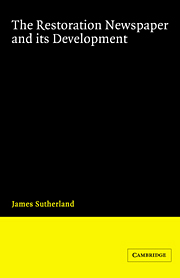Summary
In considering the supply of foreign news in the seventeenth and eighteenth centuries, it is necessary to distinguish between those few papers (notably the London Gazette) that had access to information provided by the government of the day, and all the others that were left to fend for themselves. When, in 1655, Cromwell suppressed all unlicensed newspapers and Marchamont Nedham was given the monopoly of providing the nation with news, he was also given controlled access to the foreign intelligence organised by John Thurloe, who had his own agents abroad, and was able to draw upon the reports sent in from English embassies in the various European capitals. Nedham's foreign news was therefore both ample and reliable.
After the Restoration, when Henry Muddiman's two news-books were both published ‘by order’, he too obtained most of his foreign news from the reports communicated by English ambassadors and their secretaries. Under the methodical supervision of Lord Arlington's secretary, Joseph Williamson, the organisation of foreign intelligence reached a similar peak of efficiency to that attained during the Protectorate under Thurloe. When the Gazette was founded in 1665, this excellent service of foreign news became available to the Gazetteer. Ideally, ambassadors wrote a weekly letter in cipher, containing such news as they considered it important for the government to have, while the secretaries sent home the ordinary news.
- Type
- Chapter
- Information
- The Restoration Newspaper and its Development , pp. 123 - 145Publisher: Cambridge University PressPrint publication year: 1986



